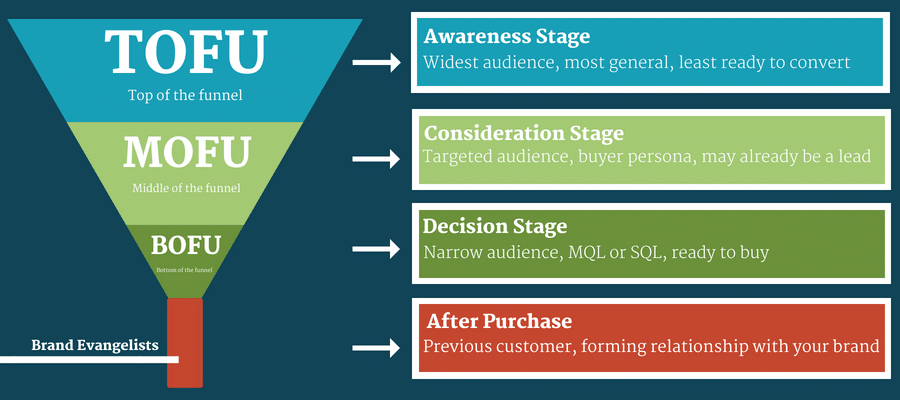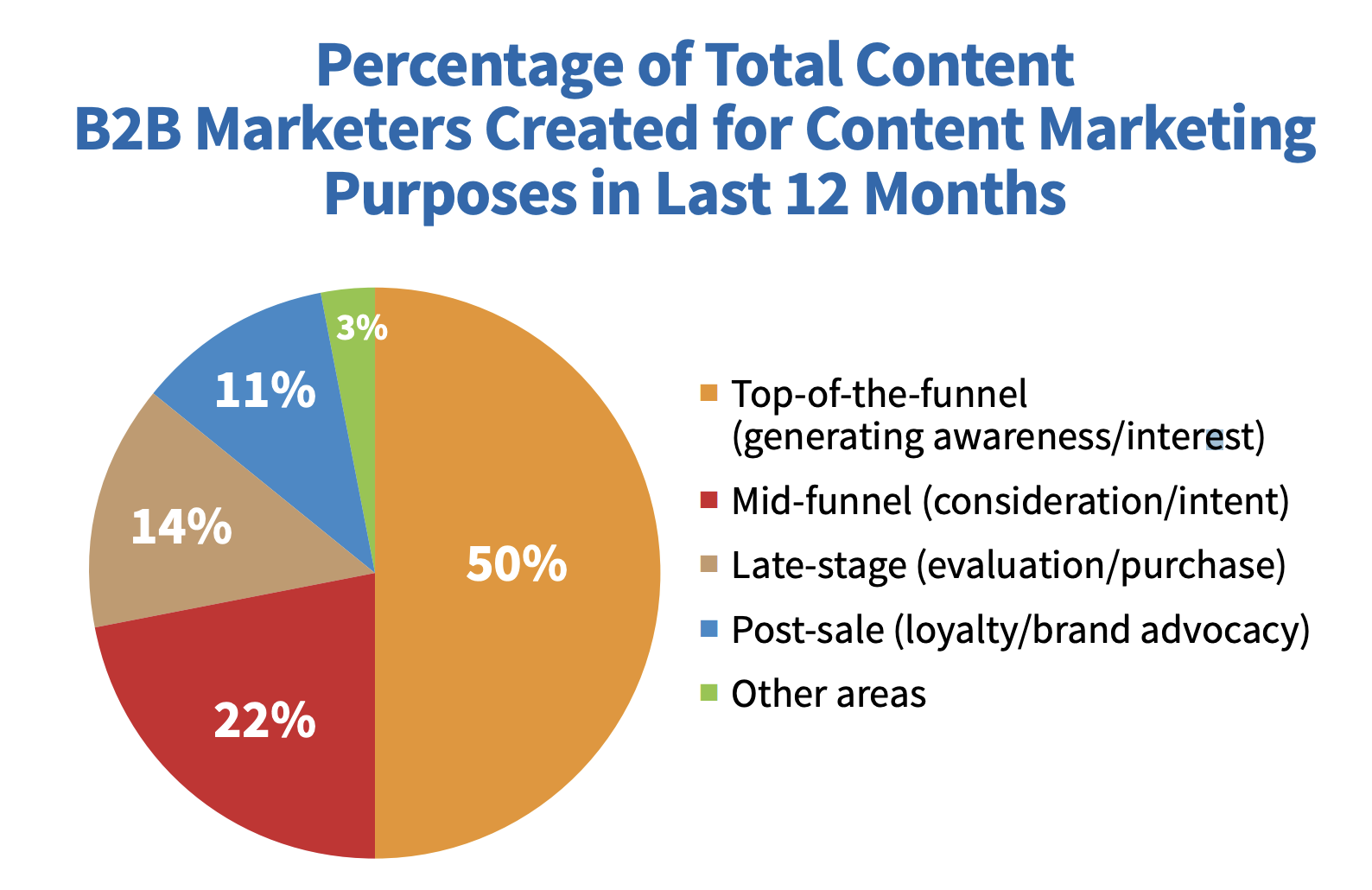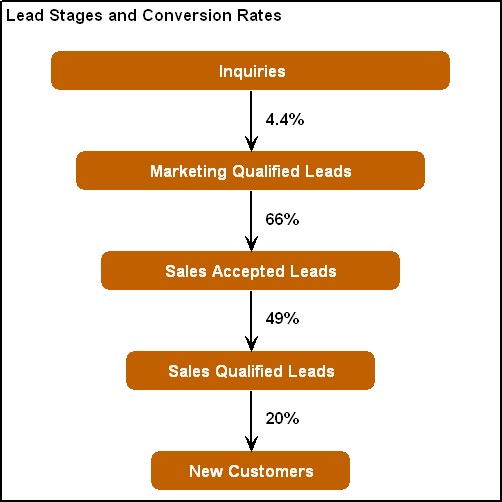[ad_1]
Recently there’s definitely been an increase in the expectation that marketers need to deliver more than they have in the past. We have to do more than just grow the traffic on our website. We need visitors that convert to leads and paying customers.
Middle of the Funnel (MOFU) content is what gets your blog visitors to convert. And good MOFU content is what 9increases your conversion rate to more qualified leads.
One of the best ways to think about MOFU content is that it is where content marketing and campaigns come together.
So let’s learn about MOFU content and how it helps increase your conversion rates.
What is MOFU Content?
MOFU content is content created for the middle of the marketing funnel with the goal of converting an unknown blog reader or website visitor into an identified prospect.
MOFU is often talked about as the 2nd stage of demand generation content along with TOFU (Top of Funnel) content and BOFU (Bottom of Funnel) content.
This is how we describe the various stages on the marketing funnel and why it is called that:
- Top of the Funnel (TOFU): Reach new prospects and build awareness
- Middle of the Funnel (MOFU): Engage new prospects and identify who they are
- Bottom of the Funnel (BOFU): Help prospects make a decision to buy from us through validation and proof points
- Retention: retain new customers through loyalty programs.
Here’s a great visual that shows how the 4 content types differ by stage. It’s called a marketing funnel because there are more people at the beginning TOFU stage than there are in the latter (BOFU stage).

So unlike TOFU content which is designed to capture someone’s attention. MOFU content is designed to gather their information.
What Types of Content Are MOFU?
While blog posts, social content, short form videos, or podcasts are the best forms of early-stage of TOFU content, MOFU content formats include Whitepapers, E-Books, Webinars (live or recorded.) Other forms of TOFU content might include Email Nurture campaigns, free templates, or even customer stories.

Whitepapers
A whitepaper is a relatively longer report on a particular topic that dives deeper into an industry problem or challenge and is intended to show an objective solution to those problems or challenges.
The term whitepaper evolved from typical colorful and glossy promotional brochures and sales sheets in the technology industry that were obviously trying to sell a company product or solution.
In contrast, a “whitepaper” was intended to appear more educational and objective, often filled with industry research, analyst quotes, and devoid of selling. Back when I was doing demand gen for larger tech companies, whitepapers were often purchased from 3rd party analyst firms like Forrester or Gartner for $10,000 or more and used as an obviously objective piece of content to get you provide your name and contact details.
These traditional whitepapers were also often 10-20 pages in length. While this practice has become less popular, the concept remains in the form of analyst reports, or shorter, more visual buying guides.
E-Books
E-Books have evolved from whitepapers to become the more visual type of guides you predominantly see today. Ultimate Guides, buyer guides are the predominant form of e-books and they typically come in around 3500 words but visually designed into about 10 pages with callout boxes for quotes and stats.
We create about 50 e-books every year for our clients averaging about $5000 each (with design!) We have a long form Ultimate Guide to Content Marketing, and here’s an example of one of our e-books
Webinars
Webinars are online / virtual events that typically will include a professional speaker or a subject matter expert providing insights like trends, tips and how to.
Templates
Template packs have become super popular recently due to their practical nature. Templates help your potential customers to solve real-world problems they are facing and encourage them to come back to your brand for more insights. Here is a link to our Ultimate Content Marketing Template (our highest converting page on the whole site!) and our content marketing starter kit:
Email Nurture
Email nurture series are responsible for driving about 75% of our leads! We try and earn our visitors email addresses through our newsletter subscription. And then we nurture those subscribers through a series of subtle and not-so subtle messages, stories, content, and promotions.
Customer Stories
I have a strong opinion about how to use case studies and customer stories in content marketing: make your customer the hero of the story!
If you check out our case studies, you’ll find they do certainly validate the success we helped our clients achieve but they mainly talk about our client’s success, not how awesome we are.
There is a way to bring product-led content into the marketing funnel, as long as we keep the customer as the hero:
Some other forms of MOFU content include checklists, videos and slideshows.
How Well Does MOFU Content Increase Conversion Rates?
We are obviously big believers that content marketing improves sales. After all, the whole reason to do MOFU content is to drive conversions.
Most people don’t visit websites to read your blogs and then ask to buy something. MOFU content keeps them engaged long enough so they can get educated on how to buy your product or service. And if you’re lucky, your MOFU content is good enough to convince them to buy from you. Not because of your features and benefits, but because you’ve built trust and authority!
So the real bottom line is that if you don’t have MOFU content, you are missing out on the majority of leads you could generate from your content marketing efforts.
According to CMI, after TOFU content, MOFU content is the 2nd largest bucket of content budget and focus:

So it’s important to focus on MOFU content and getting it right. OK so now let’s get to the math. A few years ago, a firm called Sirius decisions published research that showed that most B2B firms see a 4.4% conversion rate from inquiries (new names and email addresses) to leads or Marketing Qualified Leads (MQLs).

My own experience at SAP showed about an 8% conversion rate to MQL. The reason we scored higher was because we relentlessly tested our MOFU content. Sales and product teams would ask us to try and use brochures and fact sheets to get leads. But we found that thought leadership content was the best way to increase conversion rates.
For more updated information on lead conversion rates, check out our latest data on that.
Content Marketing Made Easy with Our Content Builder Service
If you are ready to get more traffic to your site with quality content published consistently, check out our Content Builder Service.
Set up a quick consultation, and I’ll send you a free PDF version of my books. Get started today and generate more traffic and leads for your business.
[ad_2]
Source link













